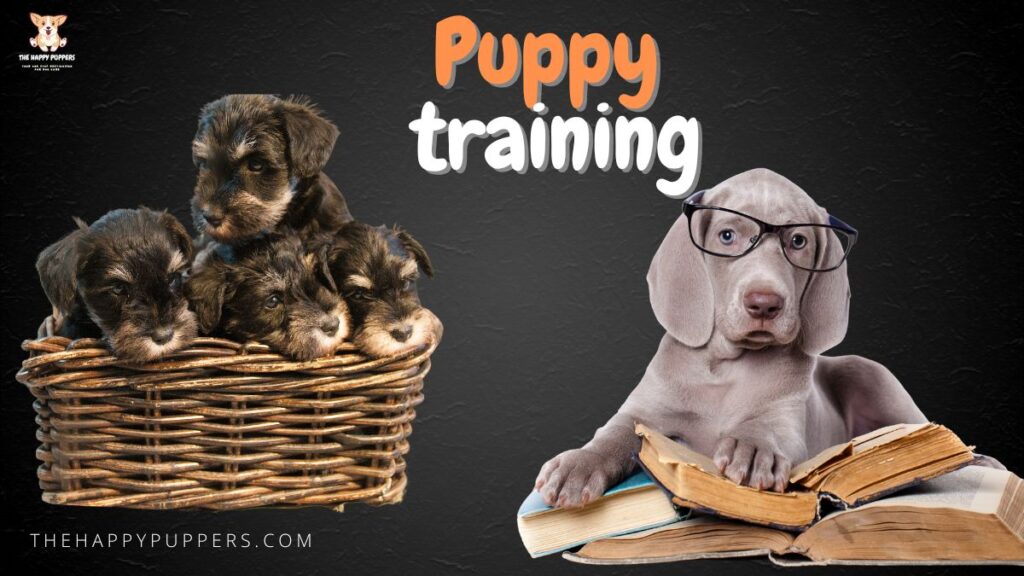You just brought home a super cute ball of fur whom you are going to love and cherish for many years to come. Your heart is jumping with joy, and you are thinking of the many years of fantastic companionship ahead of you. However, one crucial point that you cannot miss out on is the puppy training process. That is what I will be discussing in this blog post.
Puppy training not only makes life easier for you as the dog guardian, but it also provides the puppy with a life that is comfortable and full of fun. Training allows your puppy to know what’s expected of him and how to behave in different situations. This is also the best way to overcome the problems that occur during the puppyhood stages, like puppy nipping behavior, excessive barking or howling tendencies, jumping on guests, etc.
When your pup put is well trained right from the start, you can take him along with you on various adventures and have so much fun together. This also boosts your pup’s confidence in himself and helps him understand how to deal with a variety of situations.

Do you wish to know more about puppy training and socialization and hope to bring up a well-rounded puppy? If yes, then subscribe to The Happy Puppers. Your subscription will allow me to notify you about the release of new blog articles the moment they are published. If you like watching videos, please subscribe to the YouTube channel of Happy Puppers, Shruti, and Delta. Do not forget to ring the notification bell. In case of live queries, you can reach me on Twitch.
Topics covered in this blog post
Why bother with puppy training?
Every dog guardian wants to have the best-behaved pup. However, you cannot have the best-behaved pup by just hoping for the same. You have to put in hours of work and tons of patience during the puppy training process to achieve the desired results.
If your puppy is not trained right away from the puppyhood stages itself, there is a high chance that your pup will develop a plethora of behavioral issues by the time he turns into a full-grown dog.
Many dog guardians start to feel discouraged at the early stages if they do not have the time or are unable to train the puppy themselves. When such puppies are allowed to grow up with unchecked behavioral issues, guardians dump them in the shelter.
One thing that you must remember even before adopting is that you may have a thousand people in your life. Your puppy only has you. You are his whole world. Thus, please don’t adopt a puppy for the sake of it. Do so only if you are ready to invest time and money into the proper care and training of the pup.
How can puppy training help?
Puppy training is not only meant for the puppy. It is also meant for the guardian. For puppy training, you can either take your puppy to a puppy school, or you can train him right at home, all by yourself. The crucial pillars of puppy training are consistency and patience. Without these two virtues, you can not succeed.
When you train your puppy, you teach him what is expected of him in different situations. How to walk on the leash properly, how to greet guests, when barking is okay, how to not chew on every object, not jump on guests, how to greet other dogs in the park, and so much more.

Just like human kids, puppies are born with no idea of the right way to interact and behave. It is the responsibility of the guardian to teach the puppy the ways of the world. If, as a guardian, you are finding it hard to train your puppy, you can take him to puppy school. A puppy school is a place where not only the puppies but the guardians are educated too. This way, the puppy and guardian both understand the right ways of interaction and how to behave in different situations.
Benefits of puppy training
If you are wondering whether spending your time and money on puppy training is worth it not, here are the benefits of the same:
Helps build trust and communication
Puppy training gives your puppy the tools to communicate with you. You learn the body language of your puppy, and your puppy learns your body language in the process. You also understand which tools to use to elicit the right behavior from the puppy, how to use positive reinforcement in the training process, and how to get your puppy back on track if he starts to seem distracted.
Add puppy training to-do list.
You must also add puppy training to your daily to-do list. If it seems like you have taught your puppy everything, use the training session to practice what you have already taught. These sessions bolster the trust of your puppy in you, and your puppy starts to look up to you for guidance and help.
If improper behavior is left unmanaged, it will continue to get worse, and your puppy will become unruly. Thus, any negative behavior must be collected as soon as possible to prevent the behavioral issues from setting in.
As I mentioned before, puppies have no training when they take birth. They come to us with a clean slate. It’s up to us to teach them the right manners and the correct code of conduct so they can grow up to be amazing and well-behaved dogs. Puppies are also very quick at picking up on new tricks and instructions. This is why experts advise starting the training process at a young age. During this time, the puppy is most adaptable and ready to learn new things. Therefore, this crucial time must be wisely utilized by the guardians.
Your pup learns important life skills.
Life skill 1: Puppy potty training
One of the biggest life skills that your pup will learn during the puppy training process is potty training. This is one of the first things guardians have to teach their pups. In general, puppy potty training seems like a walk in the park. But, a ton can go wrong if the training is not done properly. Guardians need to display a ton of patience and positive reinforcement when they are teaching their pup to go potty.

Life skill 2: carte training
Another prime example of a life skill that you teach your pup during the puppyhood stage is crate training. A crate is not a cage for your dog. The crate is the safe haven. Whenever your dog wants some ‘me’ time or does not wish to be bothered, he can relax in the crate. However, as the guardian, it falls on your shoulder to ensure that your dog associates the crate with a positive experience.
Crate training also allows dogs to understand boundaries and schedules. Furthermore, this way, dogs learn to be independent and spend time on their own.
Reduce stress and accidents
When you train your puppy, your puppy understands what response is required of him when a specific command is given by you. This helps prevent accidents inside the house as well as outside. Furthermore, proper training allows your pup to understand how to notify you in case he needs to go out to potty.
Regular training also helps your pup prevent engaging in any kind of destructive behavior. Regular intervention at the right time will help you curb unwanted behavior and set your pup on the right path.
Prevent or reduce separation anxiety
It will also help get rid of pent-up energy and emotional issues. If your pup is very emotionally dependent on you, proper training and teaching your pup to keep busy when you are not at home can easily prevent separation anxiety. If your puppy already suffers from separation anxiety, focus on puppy training. For separation anxiety, counterconditioning and desensitization are advised. You can either do this yourself or get help from a dog trainer.Proper growth and development
Puppy training has a huge role in the proper growth and development of the pup. Training allows your pup to behave how you want, since your needs and requirements and act accordingly. Finally, a well-trained pup knows how to behave in different situations. Thus, causing very less stress to the guardian.
Helps in the long run
Experts and dog behaviorists believe that dogs who continue to learn new things and undergo training even in their senior years are less likely to develop dementia in their senior years. Therefore, training not only stimulates your dog’s brain but also keeps the brain healthy for a longer period.
Keeps the puppy safe
Puppies do not know how the world works. They do not understand where it is safe to go and where it is okay to sit. Your training provides your puppy with a guidance map that he can follow to safely get through the day without hurting himself. If you have taught your puppy the recall command, he will always come back to you no matter how busy he is playing with his friends. Recalls can also help you prevent your pup from getting hurt in an off-leash environment.

Like the recall commands, you must also train your puppy in the right technique for leash walking. This way, when you both are on walks, your puppy will not go into the incoming traffic and instead will stay by your side.
Conclusion
Puppies are like putties. They will mold themselves into the shape you want them to. However, as the guardian, their training is your responsibility. Always use positive reinforcement to train. Never go for shock collars or aversive training methods. They can have a huge negative impact on the psychology of your pup.
The more consistent and patient you are with your pup, the more well-adjusted and well-rounded your puppy will be as he grows up. Correct the mistakes, reward good behavior and be consistent in the puppy training process. If you are finding it hard to train your pup on your own, you can enlist the help of a dog trainer or behaviorist to help you out with the training. You can also enlist your pup in a puppy school. However, puppy schools also require the guardians to be there so that the guardians can understand how to continue training the pup when away from the school.
Do you want to know more about puppy training, socialization, different dog breeds, their psychology, and the care process? Then subscribe to the Happy Puppers. Your subscription will allow me to notify you of any new blog posts the moment they are released. This way, you will stay updated on all the tips and tricks from the dog care industry.

If you like watching videos, don’t forget to subscribe to the YouTube channel Shruti and Delta. Remember to ring the notification bell as well. Alternatively, you can ask me questions live on my twitch stream itself. I stream from Tuesdays to Sundays, 11 am to 7 pm, Indian Standard Time). Finally, you can reach me on any of my social media channels. I will be happy to help.
See you in my best blog post
Dr. Shruti

